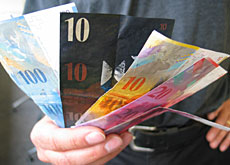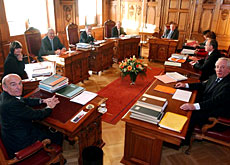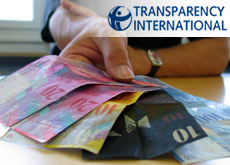Fall in cases of suspected money laundering

The Money Laundering Reporting Office (MROS) has announced a drop in the number of suspicious transactions for the first time in its seven-year history.
Officials said that the total number of cases reported fell by five per cent last year, adding that this was proof that tougher regulations were working.
Presenting its annual report on Friday, the MROS said it was informed of 821 cases of suspected money laundering in 2004, down 42 on the previous year.
It said “several” reports related to deals carried out under the terms of the United Nations Oil-for-Food programme for Iraq. These reports had been passed to the federal prosecutor’s office.
“These statistics indicate that preventive measures contained in the Money Laundering Act are beginning to have an effect,” the MROS said in a statement.
Officials noted that the bulk of convictions since the introduction of stricter reporting obligations related to minor drug trafficking, while cases involving organised crime were rare.
Although the total number of reports of alleged money laundering were down – most significantly regarding international payments – those involving banks increased yet again.
The Money Laundering Act, which came into force in 1998, places the emphasis on self-regulation and requires all financial institutions – and not just banks – to report suspicious transactions.
Suspicious payments
The MROS, which is part of the Federal Police Office, said that a 15 per cent drop in suspicious international payments was due to tighter regulations drawn up by financial institutions.
Reports from trustees and asset managers were also down. The MROS said that institutions were being more prudent when choosing their customers and had ended many previous business relationships.
The number of reports from banks, however, continued to rise – this year by 38. The total assets involved rose by 25 per cent to around SFr772 million ($638 million).
Alleged cases of terrorism financing more than doubled to 11.
The MROS said 78 per cent of the 3,493 cases reported since 1998 had been passed on to the prosecuting authorities.
Roughly half of these cases have been dealt with but the rest are still pending.
Switzerland has been criticised in the past for not doing enough to fight financial fraud and money laundering.
The government announced in January that it wanted to reinforce legislation to bring it into line with international standards. This would include extending the list of crimes connected with money laundering.
swissinfo with agencies
1990: Money laundering becomes a criminal offence in Switzerland.
1998: All financial institutions – not only banks – have to report suspicious transactions under the Money Laundering Act.
2003: The Financial Action Task Force, including Switzerland, agrees to impose stricter rules to combat money laundering and the financing of terrorism.
59% of reports came from the non-banking sector.
78% of reports were passed on to the prosecuting authorities.
Reports of suspected terrorism financing increased from 5 to 11.

In compliance with the JTI standards
More: SWI swissinfo.ch certified by the Journalism Trust Initiative










You can find an overview of ongoing debates with our journalists here . Please join us!
If you want to start a conversation about a topic raised in this article or want to report factual errors, email us at english@swissinfo.ch.